
|
Enlisted in Royal Marines I enlisted in the Royal Marines on July 27th, 1965. My mother took me to the train station, and I was off to join lots of other young men who had made their way to the military training barracks at Deal in Kent. Our Basic Training began at the Depot Royal Marines in Deal and lasted for 15 weeks. Its purpose was to convert us from civilians and teach us the basic skills that are required of a Marine. During the time at the Depot, we spent two weeks on one of the ships of the reserve fleet in Portsmouth, learning to live on board a ship and learning seamanship. Following that, we spent a week at the Amphibious Training Unit in Poole, Dorset where we learnt about amphibious operations and working from landing craft. Having successfully completed Basic Training, we then went to the Infantry Training Centre in Lympstone, just outside Exmouth, to learn infantry skills for a further seventeen weeks, six weeks of which were spent doing the Commando Course which we needed to successfully complete to qualify for our Green Berets. On arrival at Deal, we were met by a particularly smart Lance Corporal in his uniform, who collected me and several other guys and ushered us on to transport to take us to the Barracks. Once there, we were taken into a large barrack block with beds running along the length of the building on either side. We were allocated the next available bed and briefed on what was to happen. There were four other guys with me. The oldest was Dave Long, who was 26 and had been an electrician in civilian life but wanted a new life, He was a quiet sort of guy who we learnt to look up to as he was always willing to help others. George Milligan and Howard Marshal would have been in their early 20s and Pete Kelly in his teens. I was seventeen and a half. Joining us also was Mick Lee. Mick was public school educated and kept himself much to himself. He was, however, pleasant, and efficient. He went on to become a Section Commander in training and, on passing out, he later joined the Special Boat Service (SBS). We all got on well and learnt to work as a team. Over the next couple of days, there was a constant stream of new people joining us. This was the new intake block, and we were there for a week or so before being moved to smaller rooms consisting of six people per room. Once the Squad was complete, we met our Squad Instructor, a Drill Instructor by the name of Corporal Cruickshank. It was his job to weld this group of individuals into a cohesive squad of potential Marines. The thing I remember most about Corporal Cruickshank was that, although he was a disciplinarian, he was fair and did not “beast” us for the sake of doing that, although many of the instructors did. It was common to have them shout at us, which if they were right in your face could be a bit disconcerting initially, although the key thing is not to take it personally. We were taught about life in the Marines and the personal skills that we would need. As well as teaching us to drill, we needed to understand discipline and how to look after ourselves, our clothes, and our equipment. I learnt how to iron shirts and press trousers, as well as sew on buttons and darn socks. One of the first things we did as a squad was to be taken to the clothing store to draw our uniform and equipment. We were also taken to the barber to have a haircut. I had had a haircut before I went to Deal, although I might as well have saved my money as everyone was given the short back and sides that was the standard style of haircut for recruits throughout training. A high standard was expected and we relished the opportunity to show that we had reached that standard and to send proof of that fact back to our families. 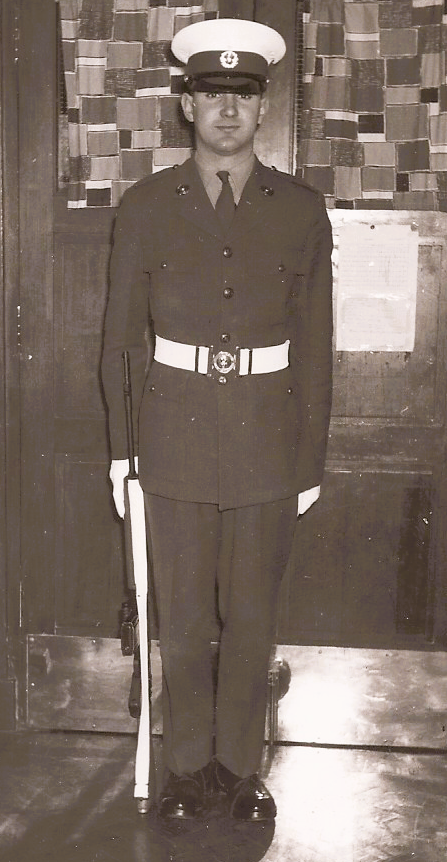 Reaching the required standard of smartness.
Recruit training was tough, both physically and psychologically. The body would say it has had enough, yet the mind would say carry on – it’s only pain – something that became a mantra during training. The first weeks were spent learning the basic skills that you would need as you progressed through training and to become a serving Marine. It was in my first few days that I realised what a good grounding my time in the ATC had given me. Already I had an advantage, as I knew how to march and how to address people. Most of all, I knew what discipline was - something that many of the recruits had to learn. I was also able to “bull” my boots and, while some struggled, I had mine with a good shine in no time at all. Some years later, when I was with the Reserve Forces and Cadet Association Committee, I would visit cadet units and be able to extoll the advantages of being in the Cadets from my own personal experience for anyone thinking of joining the military. One thing I did have to contend with though was a new name. I had always been known by the surname of “James”, which was my stepfather’s name, but my birth certificate said “Gatepain” and that’s who I was as a Marine. We were expected to know the History of the Royal Marines. I can still remember that the Royal Marines were formed on 28 October 1664 from the Trained Bands of London into the "Duke of York and Albany's Maritime Regiment of Foot" for service on HM ships. Bullying in the military is often talked about but, thankfully, it was minimal in my experience. One guy was given a cold bath and scrubbed with scrubbing brushes because he didn’t keep himself clean, but that was about it. Morale in our squad was good, as we all helped each other. Everyone was more concerned with getting through the training successfully than wasting effort in being the “Big I Am”. That attitude would not have gone down well in our squad. There were a couple of guys who would have stamped down on it if anyone had tried it on. The thing that was new to most of us was the weapon training and field craft. I had done some shooting in the ATC but this was a higher standard and had to be good. We would therefore spend time in the classroom learning the theory and then on the range putting what we had learnt into practice with just a short period for lunch. 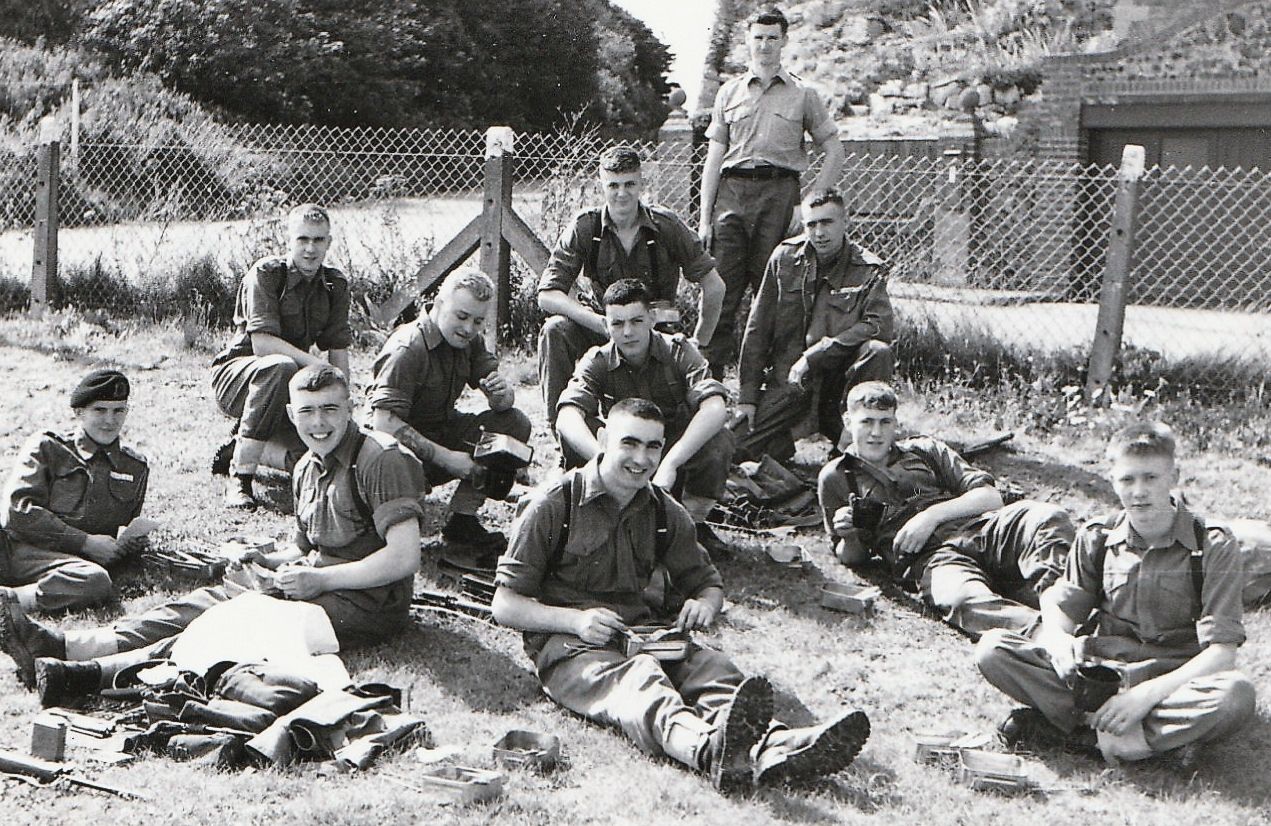 Lunch at the range, me centre front
Mistakes were punished by the training team, which could be a run around the parade ground or press-ups, although if we were in the field, that was often sit-ups, particularly if it was raining and the ground was muddy. Our accommodation would be subject to the same on-the-spot checks as we were, and woe betide us if that was found wanting. Our lockers would store our clothing and kit in a specific way and if that was not perfect then everything would be emptied onto the floor. By Christmas we had completed our initial basic training and were ready to “Pass-Out” of Basic Training and move on to the next phase. A few of the recruits had not made the grade, either because they didn’t reach the required standard, had suffered an injury, or because they had found that the Marines was not for them. It never occurred to me that I might not finish the training regardless of how difficult it was. Those who had survived the course were to have a Pass-Out Parade where families could come and see the progress we had made. My mother had a friend who lived in Kent, so she travelled down and stayed with her for a couple of days and came to watch me. 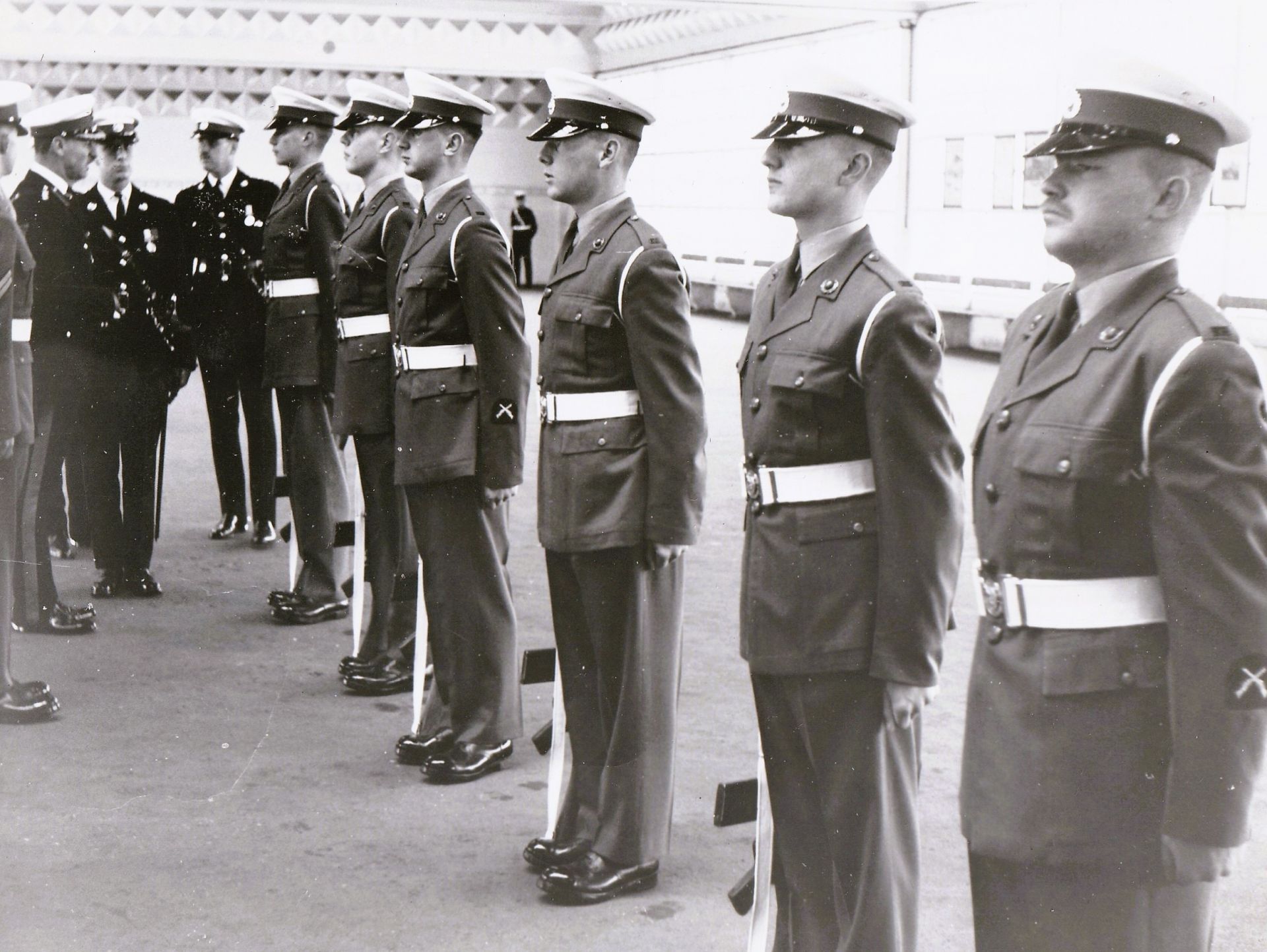 Pass-Out parade Squad Inspection at Deal, I am 4th from the right
After completing Basic Training, I had two weeks' leave and then joined my squad at Lympstone for the second part of my training. Much of this was to be spent on Dartmoor, learning to live and fight in the field. We were to learn fieldcraft and how to handle a variety of weapons. Days in the field were certainly not a time to relax and admire the scenery. I went through that stage of military skills training during the winter months, so the weather was against us and made things even more difficult. In addition to the hard weather, we had a training team known for “beasting” the recruits, whereby they would carry out actions that made life as difficult for us as they could, through shouting and punishing us with menial tasks for the slightest misdemeanour. The purpose of which, I later came to realise, was to test us physically, mentally, and emotionally and to build our character. 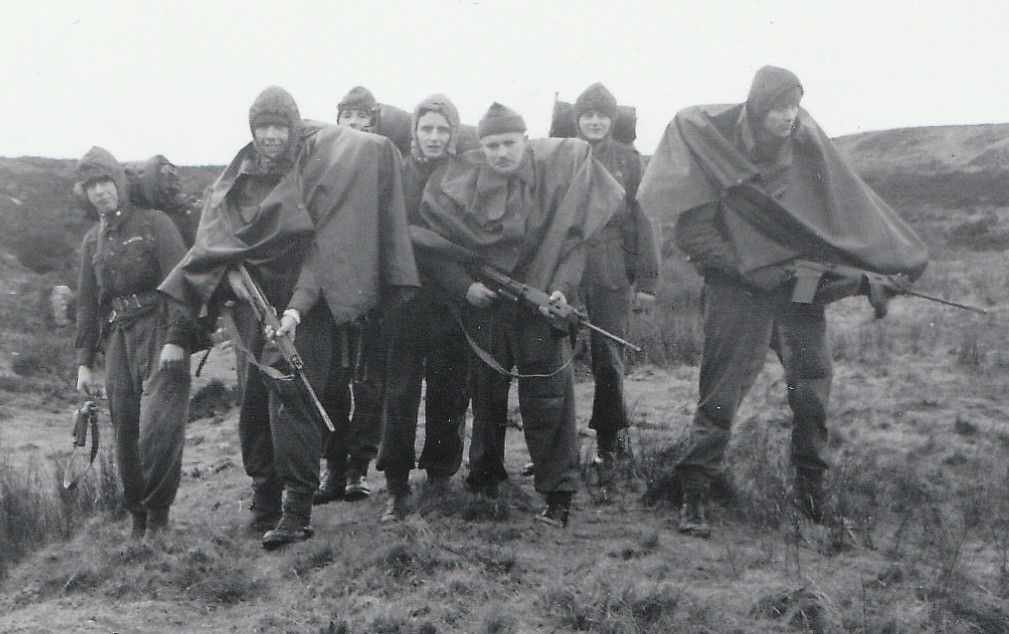 Training Exercise on Dartmoor
Prior to joining the Marines, I had been interested in photography, so I would frequently carry my camera with me, as can be seen by the photo I took of some of our Squad during a training exercise on Dartmoor. Any part of the military is great for preparing you for life, and certainly, my encountering that at the age of 17 was to hold me in good stead all my life. It gives you strength of character, and you have to be able to get on with people and work with different characters with different backgrounds, educational abilities, and from different parts of the country. We also had to continually improve our fitness, so a lot of our time was spent on Physical Training in the gym, on runs, and on assault course sessions. The accommodation in Lympstone was in new modern blocks with four-man rooms. These were situated on the edge of the hilly open moorland in North Devon and West Somerset, known as Exmoor. The camp overlooked the River Exe which flows from Exe Head, near the village of Simonsbath in Somerset, south to the English Chanel near the town of Exmouth in Devon. Being tidal, the river gave the training team plenty of opportunity to take recruits for “mud runs” along the edge of the river. We were also conveniently close to Dartmoor, and we spent many days and nights on the moor in some of the most atrocious weather conditions. When I first arrived at Lympstone, we learnt that one of the notable challenges was the Tarzan Course. This was an assault course consisting of a series of rope obstacles set in the trees 30 feet above the ground. Looking at it, I remember thinking to myself “We aren’t going to have to do that are we?” Well, we were, as that was one of the tests that we had to pass for the Commando Course. Part of the Tarzan course
There were, in fact, four tests that had to be completed in the final week. The first three tests involved carrying our rifle and equipment weighing 30 pounds on our backs. Each test had to be completed within a specific time limit. First was the Endurance Course, which consisted of a series of tunnels including a short water tunnel. These were spaced over a two-mile distance covering some very rough ground followed by a four-mile run back to camp. The second test was a Nine-Mile Speed March which had to be completed as a squad in 90 minutes. Speed marching is a combination of running and marching. At the end of the march, we had to go on the firing range and obtain a specific number of hits on target when firing our rifle in order to pass the test. The following day was the Tarzan and Obstacle Courses, which we had to do consecutively in 13 minutes. The Tarzan Course was a high-obstacle confidence course, as we started 30 feet up in the trees and descended using a death slide, using a rope toggle. This was then followed by numerous obstacles set at height such as nets and planks. Next, we had to complete the Assault Course, which was a series of ground-level obstacles with water jumps and high walls. The biggest fear for us all was that we might sustain an injury that would keep us from completing all of the required tests. The final test was the 30-Mile Speed March across Dartmoor. We were put into four-man teams and had eight hours to complete this test while carrying our weapon and about 40 lbs of equipment. Being one of the fittest in the squad was an advantage for me when it came to doing the 30-Mile Speed March. I was put with two of the other fittest guys, but we were given as our fourth team member a Naval medic who was not in such good shape as us. Because he had been attached to a Commando Unit, and anyone in a Commando Unit had to complete the entire Commando Course, he had to pass the Speed March too. The training team thought that, by putting him with the three of us, he would have a better chance of success. If one person failed, the whole team failed. I looked at this as an opportunity to repay a debt I felt I owed the medic. During an earlier exercise in the bitter cold on Dartmoor, many of the guys went down with hyperthermia, including me. It was this medic who had got me up and stamping around to get the blood circulating again, so I felt I owed him. However, this was the final test, and we certainly didn’t want to fail on any account. I do remember having some pointed words with him to get that message across. In the end, one of us was carrying all of our kit and rifles, and the other guy and I were carrying the exhausted medic. In spite of this, we finished the course within the permitted time and qualified for our Green Berets. I felt that I had fully paid my debt to the medic! Fitness is something that I have maintained throughout my life. To this day, I have a morning exercise routine, which includes sit-ups and press-ups. Over the years, I’ve added Pilates, weights, and an exercise bike. I used to include a run but, since I completed the London Marathon in 2002, I let that slip, with the exception of when I’m in Spain where I’ll run around the block. Once training was complete, we had a final Pass-Out Parade where we were officially presented with our Green Berets and marched off the square as fully-trained Marines. I was then posted to 45 Commando, which was on active service in Aden during the British conflict there. 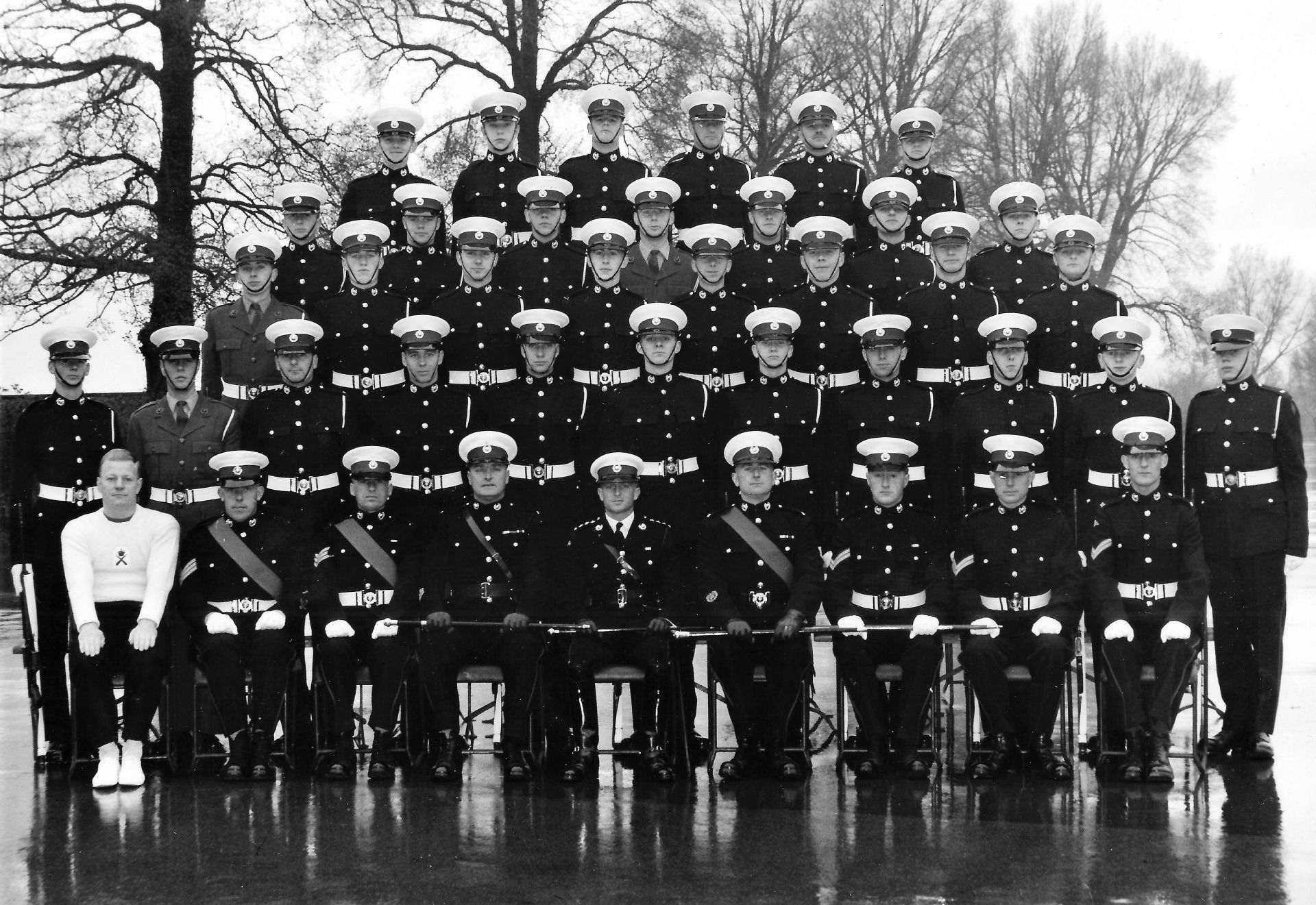 831 Squad Pass-Out Photograph. I am 3rd row up, 3rd from left.
|
|
|
|
|
| Site Map |
